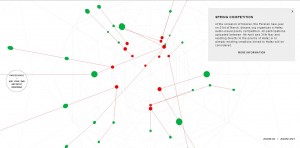
(Photo courtesy of Diwans website)
On Sunday 14 April, the Netherlands-Flemish Institute hosted a lecture on a newly launched project involving the Persian poet Hafiz and the German Poet Goethe, and the connection between them. The presentation was given by project assistant and scholar of all things Iranian, Stijn van Asch.
The project is a new website called Diwans (a collection of poems in Arabic), which chronicles the connection between the two poets, and then asks visitors to post their own reactions to the poems. The only condition is that the reactions are either video or audio files. However, the files can be of poems created by the visitors inspired by the poems of Hafiz and Goethe, or anything else they desire. The whole point of it is creativity so there are no restrictions. Upon uploading their reactions, visitors then become authors, with their names included on the website.
During the presentation, van Asch displayed some of the poems included on the website and spoke of both poets. “Hafiz often used Arabic in his poems,” he said. His name was originally Shamsu Din Mohammed Hafiz El Shirazi, but he later became famous by his nom de plume, Hafiz. Goethe was inspired by Hafiz and many of his poems mention the Persian poet by name. Goethe was also captivated by the mysteries of the East.
“They both viewed the world as a place of turmoil, but they were able to find a way to escape it by connecting with something higher and more beautiful, and feeling the beauty of a more spiritual way,” van Asch explained.
“By reason of the perfume of the musk-pod, that, at the end, the breeze displayeth from that fore-lock, From the twist of its musky curl, what blood befell the hearts!”
Excerpt of Hafiz’s poem Ala Ya Ayoha Saghi on the website, translated by Salehe Salehpour.
“I’ll in baths and taverns, too,
Holy Hafiz, think of you
If my Lovely lift her veil,
Fragrant hair shake, amber-pale:
Poet’s lyric whispered loves
Heat with sweet the houri-doves,”
Excerpt of Goethe’s poem Hagira on the website, translated by Martin Bidney.
Goethe studied other religions in addition to Christianity, but he was introduced to Hafiz quite late, at the age of 65. “He was introduced to Hafiz’s poetry through Von Hammer’s translation,” van Asch said. “He found a new way of writing poetry, between the East and West,” van Asch explained.
Goethe lived during the romantic era of literature in Europe, so traces of Orientalism can be detected in his poetry. However, van Asch defends him saying he “made a genuine effort to understand the poetry of Hafiz”. The poems on the website are available in five languages including English, Farsi and French.
Currently, the website is holding a spring competition, to celebrate the Persian New Year, Nowruz, which fell on 21 March. All submissions for the competition can be entered on the website from now until 31 May. According to the website, the winner will be awarded a monetary prize: “The jury, consisting of An van Dienderen, Arjang Omrani and Fery Malek-Madani, will award a prize of $500 to one single participant.”



